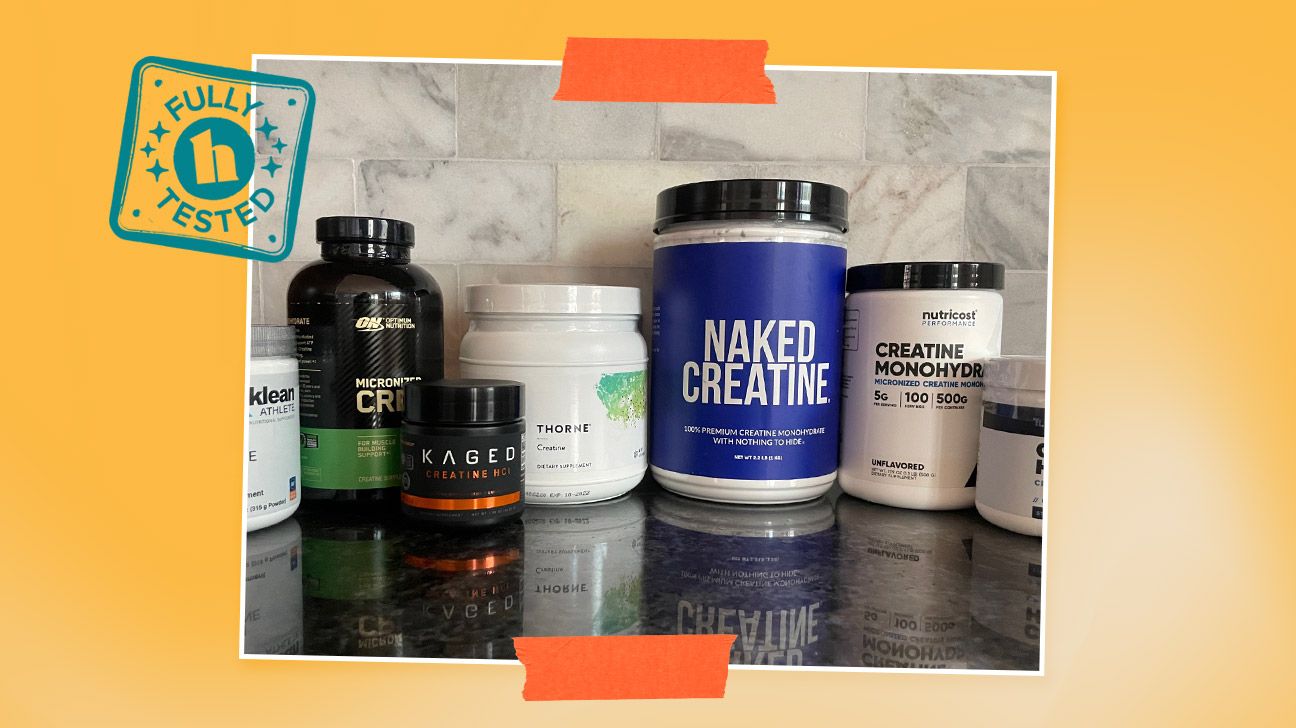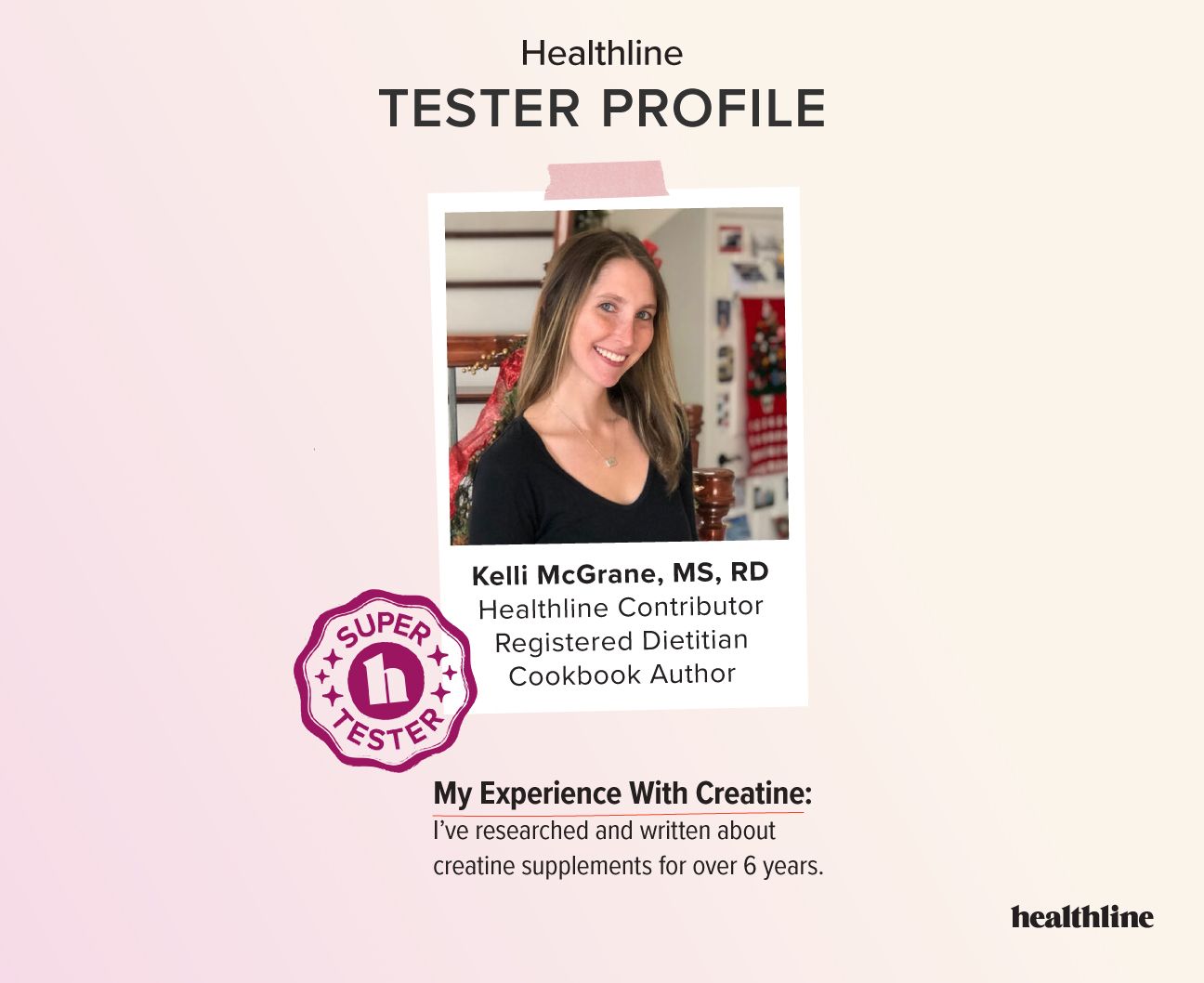Key takeaways
- Creatine is a go-to supplement among athletes for boosting energy, performance, and strength.
- Our dietitians and testers considered quality, ingredients, and taste to find the best creatine supplement.
- Their top choice? Klean Athlete Klean Creatine – a single ingredient, affordable, and easy-to-mix option with no aftertaste.

Creatine is one of the most popular sports supplements on the market due to its impressive benefits for energy, performance, and strength.
The best creatine supplement for muscle growth contains the most effective form of creatine and comes from brands that ensure the greatest purity in their manufacturing and testing practices.
The products on our list have been reviewed and vetted by our team of editors, registered dietitians, and Content Integrity Team. The products that passed our review were then tested by Healthline contributor and registered dietitian Kelli McGrane.
See which products passed our expert review and how they fared during testing.
A note on price
- $ = under $0.50 per serving
- $$ = $0.50 to $1 per serving
- $$$ = over $1 per serving
Our tester
I’m ready to get back into strength training after having two kids over the past 3 years. Between work, kids, cooking, and everything else that goes into being an adult, finding time to exercise just hasn’t been high on my priority list.
As a result, I’ve noticed a drastic reduction in strength and muscle mass. I’m curious to try creatine to see if it might be helpful for increasing my lean mass as I start to ramp up my workouts again.
• Blue Raspberry
• Fruit Punch
$$$
• 10+ flavors
• Fruit Punch
• Lemon Lime
Note: “Certified safe for sport” refers to certifications offered by NSF and Informed Sport, two companies that ensure products are free of substances banned by most competitive sports organizations.
All of the powders on our list were selected by registered dietitians and passed our extensive vetting process.
Products that passed this extensive review process were then tested by Healthline contributor and registered dietitian Kelli McGrane. An additional product, which didn’t make our list, was tested by Healthline contributor Laramy Applekamp.
For a fair comparison, all powders were mixed with water in a glass and stirred with a spoon. The amount of water used varied from 6 to 12 ounces (177 to 355 milliliters), depending on each manufacturer’s directions.
Our Medical Standards and Insights team has carefully researched and vetted over 11,000 products and services. We fact-check health claims, evaluate ingredients, and look into each brand’s reputation before sharing products and services on Healthline.
To choose the products on this page, we considered all the creatine supplements that passed our vetting process. Then, we personally tested some of them to narrow down our list even further.
Creatine is commonly known to enhance athletic performance, and its benefits may extend beyond fitness as well.
Research has found that creatine supplements may help:
- Increase strength and muscle growth: Creatine supplementation can promote muscle growth and increase strength, especially when combined with resistance training.
- Reduce muscle damage: Creatine may help reduce muscle damage and inflammation, speeding up the recovery process after intense workouts.
- Support brain health: Some
researchTrusted Source indicates that it can help reduce the impact of concussion and traumatic brain injury. - Regulate blood sugar: Creatine may
supportTrusted Source healthy blood sugar levels when combined with exercise. - Improve performance in high intensity exercise: Creatine can increase phosphocreatine levels, a compound your body uses to form adenosine triphosphate (ATP). Your body breaks down ATP for energy. For this reason, people typically use creatine supplements for high intensity exercise.
Discover more potential health and performance benefits of creatine.
How much creatine should you take?
The recommended dosage is 3 to 5 g of creatine per day for most individuals. This is the dose that has been shown to maintain creatine levels in the muscles for performance and recovery benefits.
What is the loading phase? Is it necessary?
Some individuals might opt for a loading phase to quickly saturate the muscles with creatine. This involves taking a higher dose of creatine, typically
While the loading phase will help saturate the muscles more quickly, it’s unnecessary. Sticking with the recommended 3 to 5 g daily will lead to the same result and benefit, though it may take longer.
When is the best time to take creatine?
The best time to take creatine is still up for debate. Many manufacturers recommend taking it immediately before or after your workout. However, consistent use seems to be more important than the exact timing.
Several groups of individuals may especially benefit from using creatine supplements. These include:
- Fitness enthusiasts: Creatine may be effective in supporting the goals of people looking to increase muscle strength and enhance athletic performance.
- Older adults: Research suggests that creatine supplements may also be beneficial for brain health in older adults. Plus, it can help prevent muscle loss with aging.
- Women: Women may see improvements in muscle strength and recovery, as well as bone health, when supplementing with creatine. It may also be beneficial for mood and cognitive function in women. However, studies on creatine use in women are limited, and more research is needed.
- People with certain conditions: While more research is needed, creatine may benefit individuals with certain chronic conditions, such as Parkinson’s disease.
While creatine is generally considered safe for most people, certain groups should exercise caution or avoid taking it, such as:
- Pregnant or breastfeeding people: There is limited research on the safety of creatine during pregnancy and
breastfeedingTrusted Source , so it’s best to avoid it unless recommended by a healthcare professional. - Individuals with kidney or liver disease: While research has dispelled the myth that creatine puts too much strain on the kidneys and liver in healthy individuals, it is best to use caution and work with a doctor if you have a history of liver or kidney concerns.
- People taking certain medications: Creatine can interact with some medications. For example, because creatine can help improve
blood sugar levelsTrusted Source , those taking medication to help manage blood sugar should use caution to avoid low blood sugar. It’s a good idea to consult with a healthcare professional before starting creatine if you take any medications.
One of creatine’s most commonly reported side effects is a short-term increase in fluid retention, which may result from creatine’s osmotic properties.
Creatine supplementation has also been consistently associated with weight gain, especially during the loading phase. This is typically due to increases in muscle mass and water retention rather than an increase in body fat.
Some other anecdotal side effects often reported with creatine supplementation are:
- digestive issues
- dehydration
- muscle cramps
- kidney or liver problems
However, according to the
Additionally, the ISSN notes that both short- and long-term supplementation with creatine is considered safe and effective for improving exercise performance and preventing or reducing the severity of injuries.
Useful supplement shopping guides
While no one particular brand of creatine is proven to be more effective than others, creatine monohydrate is the most researched form of creatine and is considered the gold standard.
Most of the products on our list use creatine monohydrate, and they’re all sound options.
Kaged Creatine HCI uses another form of creatine, creatine hydrochloride, which hasn’t been as well studied. However, it shows promise for being an effective form that dissolves more easily in water and may be easier for some people to digest.
The best creatine brand depends on a few different factors. We chose Klean Athlete as the best creatine supplement brand overall for its high quality supplement products and NSF Certified for Sport designation.
That being said, you can’t go wrong with any of the brands on our list. But the one that’s best for you might depend on your needs.
The right creatine for you will depend on a few factors. The best creatine brand should be third-party tested to ensure quality and safety. Consider the form — creatine powder or capsules — and whether you prefer flavored or unflavored options.
You may also want to evaluate the price and check for minimal additives, making sure the product is free of artificial flavors, sweeteners, and fillers.
Creatine is very well-studied and has been shown to be safe to take at recommended doses (3 to 5 g) daily. Some research has found that up to 30 g per day has no adverse effects when taken daily for 5 years.
Most bodybuilders use creatine monohydrate, as it is widely accepted as the most effective form of creatine.
Creatine bloat is usually temporary. It’s caused by water retention in the muscles and typically subsides after the loading phase or once your body adjusts to regular creatine use. It helps to drink plenty of water and stay hydrated when using creatine.
While creatine is one of the most effective supplements for muscle building, it can’t replace proper nutrition and a good training plan designed to support your goals.
Creatine supplements are available in various forms, flavors, and doses. Additionally, some taste better and have a smoother consistency than others.
Be sure to take a close look at the formulation of a product to determine if it meets your needs. To ensure that the product contains what it claims to be on the label, choosing a product that’s undergone testing by a third-party organization is a wise idea.







